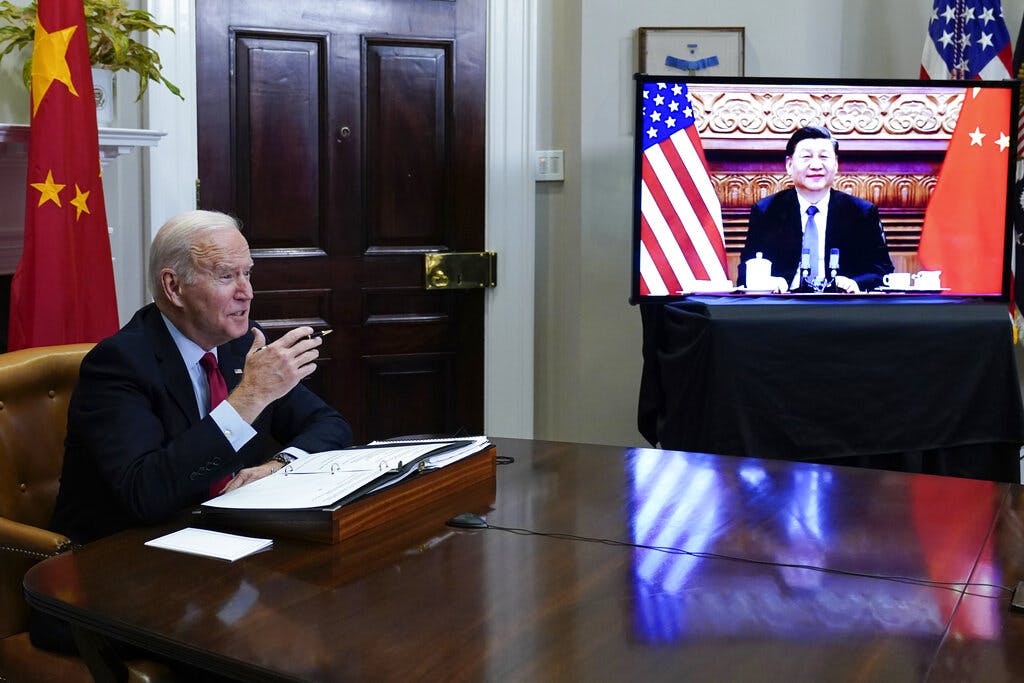Biden to Warn Xi of Consequences for Supporting Russia
Mr. Biden will question Mr. Xi about Beijing’s ‘rhetorical support’ of Mr. Putin and an ‘absence of denunciation’ of Russia’s brutal invasion of Ukraine.

WASHINGTON — President Biden and Xi Jinping are set to speak on Friday as the White House warns Beijing that providing military or economic assistance for Russia’s invasion of Ukraine will trigger severe consequences from Washington and beyond.
Planning for the call has been in the works since Messrs. Biden and Xi held a virtual summit in November, but differences between Washington and Beijing over President Putin’s prosecution of his three-week-old war against Ukraine are expected to be at the center of the call.
White House press secretary Jennifer Psaki said Mr. Biden would question Mr. Xi about Beijing’s “rhetorical support” of Mr. Putin and an “absence of denunciation” of Russia’s brutal invasion of Ukraine.
“This is an opportunity to assess where President Xi stands,” Ms. Psaki said.
China on Friday again sought to highlight its calls for negotiations and donations of humanitarian aid, while accusing America of provoking Russia and fueling the conflict by shipping arms to Ukraine.
“China has called for every effort to avoid civilian casualties all the time,” Foreign Ministry spokesman Zhao Lijian told reporters at a daily briefing. “Which do the civilians in Ukraine need more; food and sleeping bags or machine guns and artillery? It’s easy to answer.”
The America-China relationship, long fraught, has only become more strained since the start of Mr. Biden’s presidency. Mr. Biden has repeatedly criticized China for military provocations against Taiwan, human rights abuses against ethnic minorities and efforts to squelch pro-democracy advocates in Hong Kong.
But the relationship may have reached a new low with the Russian invasion.
In the days after Mr. Putin deployed Russian forces in Ukraine, Mr. Xi’s government tried to distance itself from Russia’s offensive but avoided criticizing Moscow. At other moments, Beijing’s actions have been provocative and have included amplifying unverified Russian claims that Ukraine ran chemical and biological weapons labs with American support.
Earlier this week, America informed Asian and European allies that American intelligence had determined that China had signaled to Russia that it would be willing to provide both military support for the campaign in Ukraine and financial backing to help stave off the impact of severe sanctions imposed by the West.
State secretary Blinken on Thursday reiterated that the Biden administration remains concerned that China is considering providing military equipment to Russia. He said Mr. Biden would make clear to Mr. Xi “that China will bear responsibility for any actions it takes to support Russia’s aggression, and we will not hesitate to impose costs.”
White House national security adviser Jacob Sullivan and senior Chinese foreign policy adviser Yang Jiechi met in Rome earlier this week for an intense, seven-hour talk about the Russian invasion and other issues.
Ahead of the Rome talks, Mr. Sullivan said America wouldn’t abide China or any other country helping Russia work around economy-jarring sanctions inflicted by America and other allies since the February 24 invasion.
Mr. Sullivan also said the administration determined China knew that Putin “was planning something” before the invasion of Ukraine, but the Chinese government “may not have understood the full extent” of what Putin had in mind.
Messrs. Xi and Putin met in early February, weeks before the invasion, with the Russian leader traveling to Beijing for the start of the Winter Olympics. During Mr. Putin’s visit, the two leaders issued a 5,000-word statement declaring limitless “friendship.”
Beijing’s leadership would like to be supportive of Russia but also recognizes how badly the Russian military action is going as an overmatched Ukrainian military has put up stiff resistance, according to a Western official familiar with current intelligence assessments.
The official, who was not authorized to comment and spoke on the condition of anonymity, said Beijing is weighing the the potential “reputational blowback” of being associated with the Russian camp.
The Chinese response to Russia’s request for help “is in the process of being formulated,” the official added.
Though seen as siding with Russia, China has also reached out to Ukraine, with its ambassador to the country on Monday quoted as saying, “China is a friendly country for the Ukrainian people. As an ambassador, I can responsibly say that China will forever be a good force for Ukraine, both economically and politically.”
“We have seen how great the unity of the Ukrainian people is, and that means its strength,” Fan Xianrong was quoted by Ukraine’s state news service Ukrinform as telling regional authorities in the western city of Lviv, to where the Chinese Embassy has relocated.
Despite tensions in America-China relations, Messrs. Biden and Xi have sought to keep the leader-to-leader dialogue open and have become familiar with each other through their political rise.
The two leaders first got to know each other on travels across America and China when both were vice presidents, interactions that both leaders say left a lasting impression. Friday’s phone call will be the fourth exchange between the two leaders since Biden became president.
